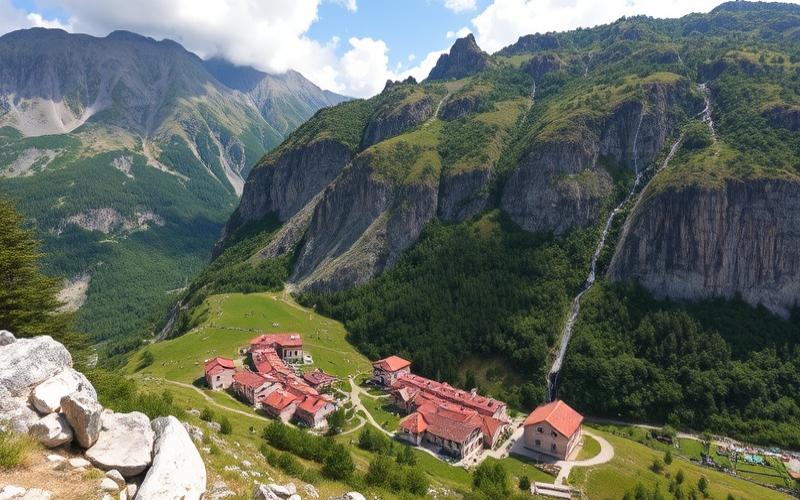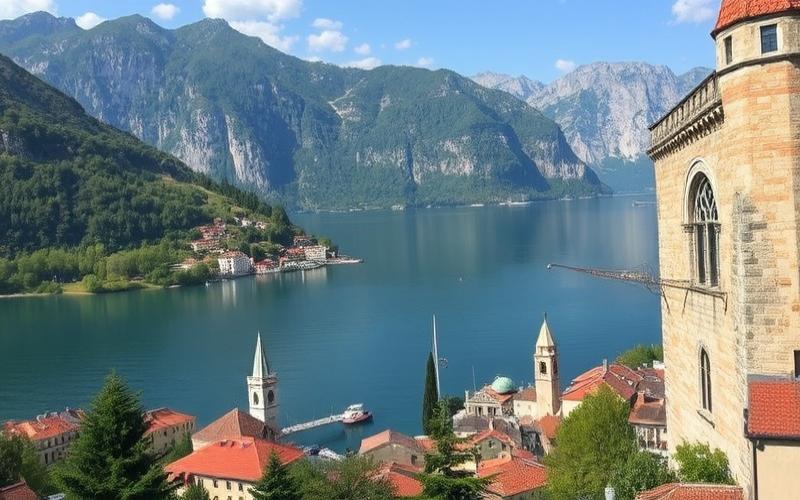
 Published on and written by Cyril Jarnias
Published on and written by Cyril Jarnias
Investing in Montenegro Through a Real Estate Civil Company: Benefits and Precautions
Montenegro, with its picturesque landscapes and strategic position in Southeastern Europe, is rapidly becoming a sought-after destination for real estate investment.
Using a Real Estate Civil Company (RECC) to invest in this country offers not only tax benefits but also ease of management and wealth transfer.
However, it is crucial to thoroughly understand Montenegro’s legal and tax specifics to avoid potential pitfalls.
This article guides you through the nuances of investing via a RECC in Montenegro, highlighting the benefits and pitfalls to avoid to optimize your investment.
Good to Know:
A RECC allows pooling investments among several partners while benefiting from advantageous tax treatment.
Understanding the Benefits of a RECC for Investing in Montenegro
A Real Estate Civil Company (RECC) is a legal structure that allows multiple individuals, called partners, to jointly own and manage one or more real estate properties. Each partner receives shares proportional to their contribution to the capital. Day-to-day management of the property or properties is entrusted to one or more managers appointed by the partners, while major decisions are made in a general meeting.
How a RECC Works
- At least two partners required
- Financial or in-kind contributions (real estate assets)
- Wealth distribution according to each partner’s share
- Appointment of a manager responsible for daily administration
- Major decisions made collectively
Benefits for Investing in Montenegro
Investing through a RECC offers several specific advantages for the Montenegrin real estate sector:
| Advantage | Description |
|---|---|
| Collective Management | Allows investing with multiple parties and pooling risks |
| Simplified Transfer | Shares are easier to transfer than direct real estate |
| Adapted Taxation | Option to choose different tax regimes based on partners’ situations |
| Wealth Protection | Clear separation between personal wealth and that held by the RECC |
| Statutory Flexibility | Easy adaptation to changes in the real estate project |
Wealth Management and Transfer
Indirect ownership through a RECC greatly simplifies transfer: it only requires transferring all or part of the shares to heirs, thus avoiding the complex division typically associated with individual real estate properties. This also allows for gradual succession management (staggered gifts).
Taxation
The RECC offers different tax options: it can be subject to income tax (IT), where each partner declares their share in their personal income, or choose corporate tax (CT), sometimes allowing optimization of certain costs related to depreciation.
Protection Against Local Uncertainties
In case of regulatory or economic instability in Montenegro, the corporate structure better protects foreign investors’ interests: it is the company that holds the real estate rather than an individual directly exposed.
Concrete Examples
A French family group wishing to purchase a rental building in Montenegro created a RECC so that each member held shares corresponding to their initial investment. Through this structure:
- They could easily distribute rental profits.
- In case of a member’s death, their heirs automatically received their shares without having to sell all or part of the property.
- When they needed to sell their investment after a few years due to an unfavorable local tax change, they could simply transfer their shares rather than going through a complex local notarial process.
Another case: two foreign investors who jointly acquired a buildable plot secured their partnership through an agreement precisely defining their respective rights via their participation in the RECC.
Practical Tips for Creating and Managing a RECC in Montenegro
- Research local equivalents: some legal forms inspired by French RECCs exist but require adaptation according to Montenegrin law.
- Carefully draft the articles of association: clauses related to partner entry/exit, transfer/transmission methods must be adapted to the local context.
- Essential to work with local experts (notaries/lawyers) proficient in both Montenegrin law and that of your country of residence.
- Consider all local reporting obligations regarding foreign ownership and cross-border taxation.
Key Takeaways
Creating a RECC therefore not only facilitates collective investment but also offers administrative flexibility and wealth security during complex real estate operations in Montenegro.
Good to Know:
A Real Estate Civil Company (RECC) in Montenegro allows multiple investors to own shares in a property, thereby facilitating the management and transfer of real estate assets. Investing through a RECC offers tax advantages, such as optimizing capital gains taxes and inheritance duties. For example, the RECC provides great flexibility in structuring wealth, which can be crucial in the face of local real estate market fluctuations. It helps bypass obstacles like restrictions on direct property acquisition by foreigners. To effectively create and manage a RECC in Montenegro, research the minimum capital requirements and local reporting obligations. Carefully analyzing Montenegrin tax implications allows you to maximize the financial benefits offered by this structure.
The legal framework for Real Estate Civil Companies in Montenegro has several specificities that every investor should know. Montenegro offers a relatively favorable environment for foreign investors in the real estate sector, with simplified procedures compared to other countries.
Legal and Regulatory Framework
Montenegro grants foreign investors the same rights as local citizens regarding real estate ownership. This openness is a major asset for investors wishing to create a structure equivalent to a RECC. The Cadastre Law governs the registration of real estate properties and property rights, making the registration of any purchase in the cadastre mandatory.
Essential Administrative Steps
To establish a real estate management structure in Montenegro, several steps are essential:
- Obtaining a tax identification number (PIB) from the Montenegrin tax administration
- Drafting a contract or articles of association, which must be written, similar to a French RECC
- Certification by a Montenegrin notary who verifies the legality of the transaction
- Registration with the cadastre (Katastar) to formalize the owner status
Recent Regulatory Developments
| Area | Recent Changes |
| Investment Control | Strengthened monitoring mechanisms for large-scale transactions |
| Environmental Standards | New requirements for new constructions and renovations |
| Administrative Procedures | Progressive digitalization of real estate-related services, including the cadastre |
| Taxation | Implementation of a progressive scale for transfer duties (2024) |
Tax Considerations
The Montenegrin tax system has undergone significant changes, notably with the introduction of a new progressive scale for transfer duties in 2024. Investors must anticipate potential additional tax adjustments, especially for certain types of investments considered priorities for the country’s development.
Points of Caution for Foreign Investors
Despite the openness of the Montenegrin real estate market, some historical particularities remain. It should be noted that Montenegro’s ancient fundamental law stipulated that only a Montenegrin could own real estate in Montenegro. Although this restriction has been relaxed, it is recommended to work with local professionals (lawyer, notary) to effectively navigate the current legal framework and ensure all steps are correctly followed.
Good to Know:
To create a Real Estate Civil Company (RECC) in Montenegro, investors must ensure compliance with the laws of the Companies Act and the Real Estate Property Act, as well as the guidelines of the Montenegrin Agency for Foreign Investments. Registration in the commercial register maintained by the Center for Business Activity Registration (CRPS) is mandatory, as is obtaining any specific real estate licenses through municipal administration offices. RECCs are subject to a 9% corporate tax, and it is crucial to regularly fulfill tax reporting obligations. Foreign investors should be aware of land restrictions that may apply to land acquisition and the need to provide certified documents, often with translation into Montenegrin. Additionally, transparency of ownership structures is required to avoid disputes, and consulting a local legal advisor is highly recommended to effectively navigate this dense regulatory framework.
Tax Optimization: Getting the Most Out of Your RECC in Montenegro
Montenegro offers an attractive tax framework for Real Estate Civil Companies (RECCs), particularly in terms of tax rates and benefits related to international compliance.
Tax Regimes Applicable to Real Estate Companies
- Progressive corporate tax based on profit:
- Up to €100,000: 9%
- From €100,000.01 to €1.5M: €9,000 + 12% of profit above €100,000
- Above €1.5M: €177,000 + 15% of profit above this threshold
- Standard VAT: 21%. Reduced rate of 7% for certain essential products. Exemption for exports or certain specific operations.
- Companies must file an annual tax return by March 31 and pay monthly installments.
| Annual Profit | Applicable Rate |
|---|---|
| ≤ €100,000 | 9% |
| > €100,000–€1.5M | 12% |
| > €1.5M | 15% |
Exemptions and Tax Incentives
- Exemption for up to eight years on corporate tax for creation in an economically underdeveloped municipality (total cap: €200,000).
- This exemption does not apply to primary agricultural activities or certain sectors like transport or catering.
- Profits reinvested in agricultural projects may benefit from a tax reduction.
International Tax Treaties
Montenegro has signed several bilateral tax treaties aimed at avoiding double taxation. This generally allows:
- Avoiding double taxation on dividends or real estate capital gains (in your country of residence and in Montenegro)
- Sometimes benefiting from reduced withholding taxes
Practical Tips to Maximize Your Profits While Staying Compliant
List of best practices:
- Maintain rigorous accounting for at least five years
- Scrupulously comply with periodic reporting (monthly/annual)
- Engage a local accountant specialized in Montenegrin taxation
- Anticipate and structure any distribution or repatriation of dividends to optimize their taxation through the appropriate tax treaty
In case of non-compliance, you risk high administrative penalties, including administrative closure or even criminal prosecution.
Long-Term Tax Implications & Legal Strategies
To secure your real estate investment through a RECC in Montenegro:
Solid tax planning is essential. It is recommended:
- To fully exploit local exemptions during the first years.
- To intelligently use international treaties to optimize the repatriation of funds to your country of residence.
- To prioritize investment/restructuring when it allows for legal deferral or reduction of tax payments.
The competitive rates combined with bilateral treaties thus allow—with professional guidance—to sustainably optimize your net returns while strictly respecting local law.
Good to Know:
In Montenegro, tax optimization for a RECC relies on favorable tax regimes such as a reduced corporate income tax rate and potential exemptions for foreign investors. The double taxation agreements Montenegro has concluded with several countries also help minimize the tax burden on cross-border income. It is crucial to properly structure your RECC to benefit from competitive tax rates and exemptions, while ensuring compliance with Montenegrin legislation. Tips include proactive tax planning to anticipate regulatory changes and make the best use of tax treaties. Long-term implications suggest considering reinvesting profits in local real estate, which could entitle you to additional tax benefits, while ensuring all legal procedures are meticulously followed to avoid penalties.
Avoiding Common Pitfalls When Investing Through a RECC in Montenegro
When investing through a Real Estate Civil Company (RECC) in Montenegro, several common pitfalls must be anticipated to optimize profitability and limit risks.
Main Pitfalls to Avoid
- Neglecting Local Laws: Many investors underestimate the complexity of Montenegrin regulations, particularly regarding foreign ownership, local taxation, and administrative obligations. For example, some buyers find themselves unable to assert their rights over a property due to failure to comply with a specific notarial procedure or ignorance of certain restrictions related to urban zoning.
- Misunderstanding Tax Implications: It is common for investors not to consider the tax applicable to foreign RECCs or international tax treaties. This can lead to double taxation or penalties for non-filing.
- Inappropriate Choice of Partners or Assets: Partnering without due diligence exposes you to internal conflicts or entry into a poorly managed structure. Similarly, investing in a poorly located property (e.g., solely dependent on tourism when the sector is declining) increases the risk of prolonged vacancy.
- Underestimating Recurring Costs: Fixed charges (management fees, routine and exceptional maintenance, annual taxes) are often minimized in the initial business plan. However, these expenses can significantly erode expected returns or even generate a deficit if the market stagnates or declines.
| Pitfall | Possible Consequence | Concrete Example |
|---|---|---|
| Ignorance of Local Law | Administrative Blockage / Partial Capital Loss | Omission of a notarial formality rendering the sale void |
| Poorly Anticipated Taxation | Double Taxation / Penalties | Failure to file tax returns in both France and Montenegro |
| Inadequate Partners | Decision-Making Deadlocks / Disputes | Disagreement on management leading to property immobilization |
| Poor Real Estate Choice | Prolonged Vacancy / Loss of Value | Acquisition in an abandoned tourist area |
| Underestimated Costs | Negative Return | Unexpected overcost due to mandatory renovation |
Practical Tips to Mitigate These Risks
- Systematically engage local experts (lawyers specialized in Montenegrin real estate law and international tax advisors).
- Thoroughly study all regulations applicable to foreigners and foreign companies owning property locally.
- Conduct an in-depth analysis of the local market before any acquisition: assess not only rental potential but also regional macroeconomic trends (e.g., tourism dependence).
- Clearly formalize partner relationships from the start: an extra-statutory agreement detailing decision-making procedures and potential exit clauses.
- Prepare a realistic budget including all ancillary costs: local taxes/property taxes, legal/manager fees, reserves for future work.
Concrete Examples
A French investor purchased via RECC an old apartment in a seaside resort without checking its urban compliance; the local municipality imposed significant post-purchase upgrades whose cost and timeline he had not anticipated. Another typical case involves two partners who invested together without a clear clause on transfer modalities; after a major personal disagreement, they were stuck for several years with no immediate legal possibility of quick sale.
In summary:
- Rigorous Legal/Tax Preparation
- Local Professional Support
- Prudent Analysis of Both Human and Real Estate Factors
are essential to secure your investment via RECC in Montenegro.
Good to Know:
Investing through a RECC in Montenegro may seem attractive, but it is crucial to avoid certain common pitfalls to ensure the success of your investment. First, neglecting local laws, which are often specific, risks complicating your project; it is therefore essential to understand them well or consult a local legal advisor. Tax implications, sometimes misunderstood, can significantly reduce your returns; consult a tax specialist to anticipate and optimize your tax obligations. Choosing the wrong business partners or inappropriate assets, such as poorly located or overvalued real estate, is another frequent mistake. To mitigate risks, seek reliable partnerships and conduct rigorous due diligence. Finally, underestimating maintenance and management costs can lead to unexpected expenses; establish a precise budget and allocate sufficient funds for ongoing property upkeep. A concrete example is an investor who, by underestimating the restoration costs of a historic building, saw their profits wiped out. Use these precautions to ensure a smooth and profitable investment experience.
Disclaimer: The information provided on this website is for informational purposes only and does not constitute financial, legal, or professional advice. We encourage you to consult qualified experts before making any investment, real estate, or expatriation decisions. Although we strive to maintain up-to-date and accurate information, we do not guarantee the completeness, accuracy, or timeliness of the proposed content. As investment and expatriation involve risks, we disclaim any liability for potential losses or damages arising from the use of this site. Your use of this site confirms your acceptance of these terms and your understanding of the associated risks.

















































